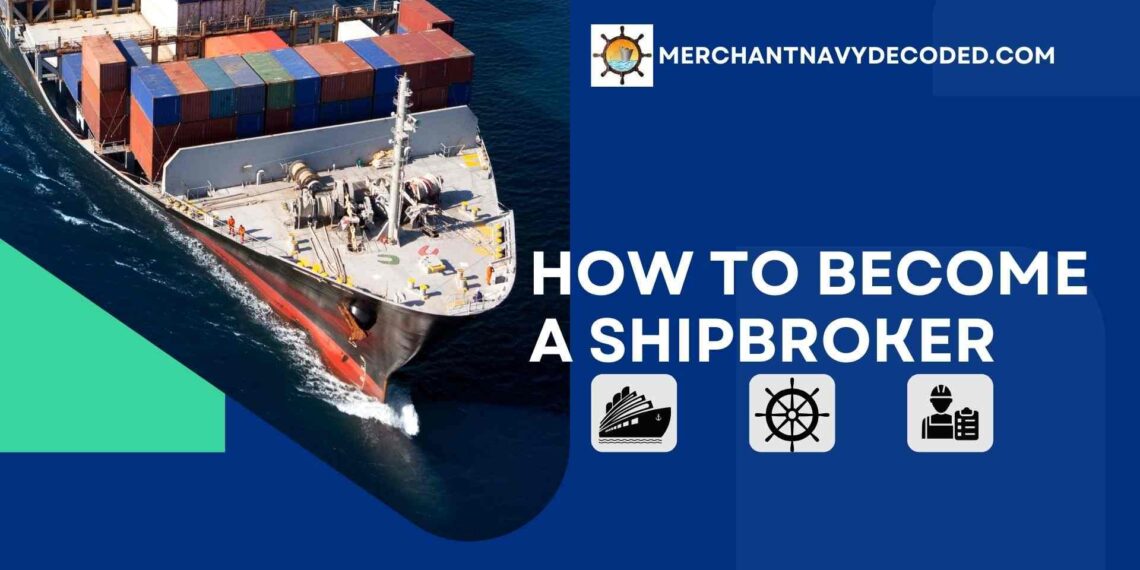How to Become a Ship Broker.
Overview
A ship broker is a professional who works as a mediator between charters and owners. They facilitate the buying, and selling of the vessels. They are responsible for the handling of cargo, and delivery of it. There are different types of ship brokers, they are divided according to the types of vessels they can facilitate. To become a ship broker you need to acquire some skills that are required and a specific degree is not required, it depends on the company and its eligibility criteria.
1:-Types of Ship Brokers
Some of the subdivisions of shipbrokers are:
- Sale and purchase Broker
- Gas Carrier Broker
- Container Broker
- Offshore Broker
- Dry Bulk Carrier
- Tanker broker
Ship brokering is divided into many subdivisions according to the types of business they handle. Building relationships in the industry with clients, ship owners, charters, and cargo owners is essential. Understanding their needs and providing them with excellent service and fulfilling their needs.
2:- How to Become a Ship Broker.
To become a shipbroker, the individual needs to have a combination of communication skills, education, good professional connections in the shipping industry, and knowledge about the industry. Gaining experience in the industry is very essential.
2.1:- Educational Requirements to Become a Ship Broker
In ship brokering, it doesn’t require any specific degree or academics. The individual can get a degree that should be relevant to the maritime sector. Pursuing a program will help you get a better college. You can get a bachelor’s degree and it will give you an understanding of the maritime sector.
2.2:- Colleges for Ship Brokering
There are some colleges in India and abroad that offer courses that provide you with a relevant degree that will help you understand the field.
- Cardiff University
- University of Plymouth
- World Maritime University
- Nanyang Technological University
- Southampton Solent University
2.3:- Courses For Ship Brokering
There is no specific course for ship brokering and there is no such college that provides the exact course that you need but here are some relevant degrees that will give you an understanding of this field.
- Maritime Policy and Shipping Management (MSc)
- Maritime Operations and Management (MSc)
- Shipping Law (LLM)
- Shipping Finance
- Marine Insurance
- International Shipping (MSc)
- MBA in shipping management
- MBA in logistics and supply chain
2.4:- Joining a Shipping Company
After completing the course you can join a company to gain experience. You will get to know the different aspects of the shipping industry. In the beginning, you will join as a vessel operator and be monitored by the company, after working for the required amount of period you’ll be promoted to chartering manager. After that as a junior executive and then as a senior executive till your provision period ends.
The individual can also take exams from the Institute of Chartered Shipbrokers(ICS) to become a chartered broker. You will have to clear this series of exams, it consists of three exams, and the individual needs to clear all three.
If you want to dive more into the topic of Ship Chartering and Ship Brokering then you should check out our free Ship Chartering and Ship Brokering where you’ll get to learn more aspects about the life and opportunities in the field of Chartering and Brokering.
Find out more about the skills required to become a Ship Broker with our dedicated blog on Qualities Required to Become a Ship Broker.
3:- Career Graph of a Ship Broker
Becoming a shipbroker is not easy, it takes a lot of hard work and determination. However, the rewards are also befitting for the hard work that you will do.
- Good Career Growth
In the commercial shipping sector career growth is fast as compared to the merchant navy. Your growth in the industry depends on how you establish yourself, your connections, and the company’s trust.
- Quick Promotions
Getting promoted from one rank to another is quick and you will be promoted as a ship broker in 2 – 3 years.
- Good Commission
The commission can be 2 to 3 times the salary and the commission depends upon the company. It can be 1% or 1.25% of the trade that you did.
4:- Keypoints to Become a Ship Broker
- Learning at Entry Level
You will have to join at an entry-level to learn the basics of the industry, how to do market analysis, learning about different types of vessels and shipping routes.
- Ranks to join for becoming a shipbroker
Roles such as vessel operator, and chartering manager, are stepping stones to becoming a shipbroker.
- Gaining Experience
When you gain experience you can join as a junior executive and gain experience. After that, you’ll be promoted to a senior executive, and after completing the provision period you can become an independent shipbroker.
5:- Steps to Become a Ship Broker from a Mariner?
To transition from being a sailor to becoming a shipbroker, the individual will have to follow some steps:
- Step 1: Pursuing programs will help you gain an understanding of the industry and its terminologies.
- Step 2: The individuals can enroll themselves in programs such as the Executive Maritime Management Program and these programs work as equivalent to a graduation degree.
- Step 3: You can choose a Foundation Diploma and an Advanced Diploma. After completing the courses the individual can enroll in post-graduation courses such as MSc, or MBA degree in relevant branches.
You need to make connections in the shipping industry and join a company as a vessel operator or junior executive (it depends on the company) to begin your career as a shipbroker.
After being in the maritime sector, the mariner will have an advantage, the advantage of technical knowledge because companies and firms will prefer a candidate who knows the industry, and having a CoC will make the candidate more valuable.
6:- Conclusion
Becoming a shipbroker is not easy, it involves a lot of hard work and determination. The individual needs to acquire communication skills and negotiation skills. These skills are very essential to maintain transparency and you need to be vigilant with your words throughout the conversations. Gaining practical skills is also necessary through internships and joining entry-level positions in companies. The key to becoming a proficient shipbroker is maintaining integrity and ethically conducting the contracts.
Disclaimer :- The opinions expressed in this article belong solely to the author and may not necessarily reflect those of Merchant Navy Decoded. We cannot guarantee the accuracy of the information provided and disclaim any responsibility for it. Data and visuals used are sourced from publicly available information and may not be authenticated by any regulatory body. Reviews and comments appearing on our blogs represent the opinions of individuals and do not necessarily reflect the views of Merchant Navy Decoded. We are not responsible for any loss or damage resulting from reliance on these reviews or comments.
Reproduction, copying, sharing, or use of the article or images in any form is strictly prohibited without prior permission from both the author and Merchant Navy Decoded.




Good! Insightful
Glad you liked it. Check out our free Ship Brokering and Ship Chartering Course to get more insight about brokering and chartering of the ship.
It’s is very useful
But how I will make money as a ship broker and how much?
Hi Mohit, you can learn everything about ship broker from our free Ship Chartering and Brokering Series.